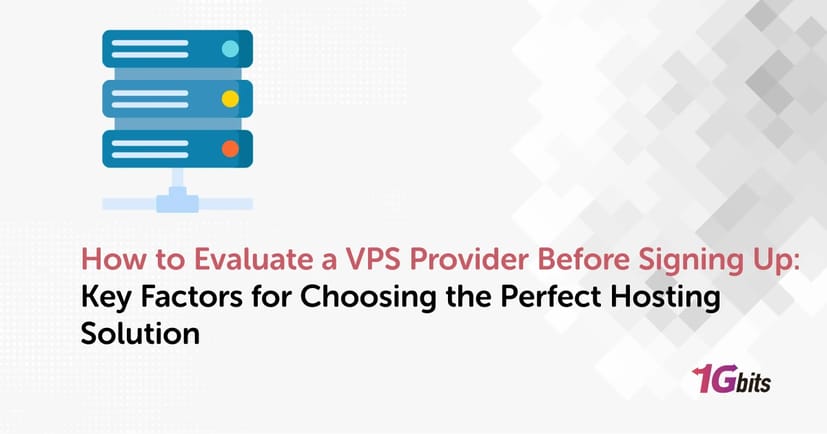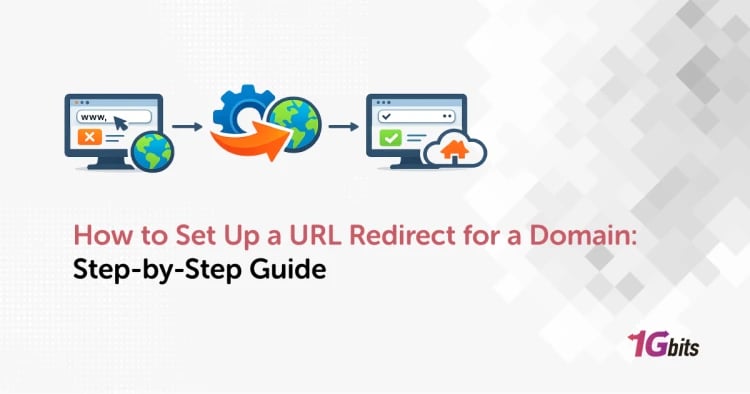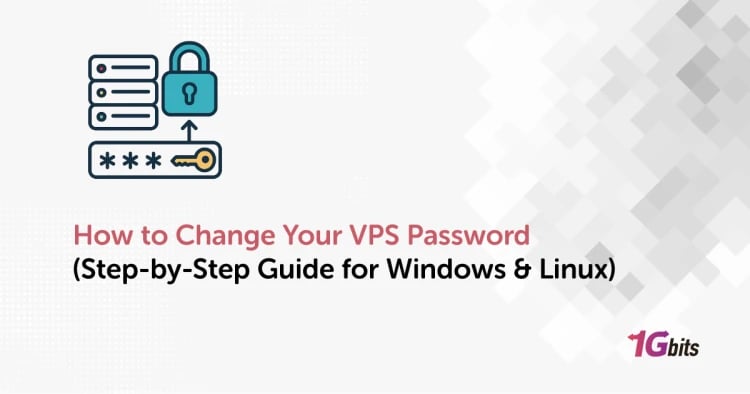When it comes to hosting your website or applications, understanding How to Evaluate a VPS Provider Before Signing Up is essential for making an informed decision. With a wide list of VPS providers available, it’s important to carefully evaluate a VPS provider based on performance, reliability, and scalability to meet your specific needs. To ensure you make the right choice, learn how to choose a VPS by considering factors such as pricing, support, and the resources offered. If you're unsure how to choose a VPS provider, start by analyzing reviews and conducting an evaluate a VPS provider free trial, when available, to test their services firsthand. Knowing how to evaluate a VPS provider allows you to compare VPS providers effectively, ensuring that the one you choose aligns with your goals and budget. Follow this guide on How to Evaluate a VPS Provider Before Signing Up to avoid pitfalls and maximize your investment. ALSo read How to buy a VPS. If You need VPS, visit Buy VPS Hosting.
How to Evaluate a VPS Provider Before Signing Up

1.Uptime
When exploring How to Evaluate a VPS Provider Before Signing Up, uptime emerges as one of the most important factors to consider. Uptime is the percentage of time a server is fully operational and accessible, directly influencing the availability of your website or application. A high uptime percentage ensures your users can consistently access your services, minimizing disruptions. Providers often guarantee a specific uptime level, such as 99.9%, which equates to less than an hour of downtime monthly. Understanding this metric is essential when you evaluate a VPS provider before signing up to ensure uninterrupted performance. َAlso read The Best Linux VPS Hosting, Best Forex VPS, and Best VPS Hosting Providers.
The Importance of Uptime
Uptime is crucial for businesses that rely on constant online presence. Frequent downtimes can result in lost revenue, frustrated users, and damaged reputations. When considering how to evaluate a VPS provider before signing up, check their SLA (Service Level Agreement), which outlines the provider's uptime guarantees and compensations if the uptime falls below expectations. This step is integral in how to choose a VPS that supports your reliability needs.
Infrastructure and Monitoring
When learning how to evaluate a VPS provider before signing up, it's vital to assess their infrastructure. Providers offering redundant systems, multiple data centers, and load balancing are better equipped to maintain high uptime. Additionally, consider whether the provider uses advanced monitoring tools to detect and resolve issues before they affect your services. Evaluating these features helps you compare VPS providers and choose one with robust mechanisms for minimizing downtime. Also read The Ultimate Beginner’s Guide to VPS Hosting.
Researching and Comparing Providers
To evaluate a VPS provider before signing up, research their uptime history through third-party monitoring services or independent review platforms. Reputable providers are often transparent about their historical uptime performance, which allows you to compare VPS providers effectively. When deciding how to choose a VPS, prioritize providers with consistent uptime over extended periods.
Balancing Cost and Uptime
While affordability is a consideration in how to evaluate a VPS provider before signing up, prioritize uptime reliability over low prices. Cheaper providers may lack the infrastructure necessary for high uptime, resulting in costly downtimes. Investing in a provider with strong uptime guarantees ensures the long-term success of your online presence.
By focusing on uptime, you’ll gain a comprehensive understanding of How to Evaluate a VPS Provider Before Signing Up and make an informed choice that supports your business goals
2.Speed
When considering How to Evaluate a VPS Provider Before Signing Up, speed is a critical metric that significantly impacts the performance of your website or application. Speed determines how quickly your server responds to user requests, directly affecting user experience and search engine rankings. A fast server ensures that your site loads quickly, keeping visitors engaged and satisfied. To properly evaluate a VPS provider before signing up, you need to assess the factors that influence speed, such as server hardware, network connectivity, and resource allocation.

Why Speed Matters
Speed is essential in delivering a seamless user experience, especially for businesses with high traffic or resource-intensive applications. Slow servers can lead to frustrated users, increased bounce rates, and lost revenue. When exploring how to evaluate a VPS provider before signing up, prioritize speed to maintain your site's competitiveness and reliability. Providers offering high-performance SSDs, modern CPUs, and robust network infrastructure are better suited for speed-intensive applications.
Key Factors Influencing Speed
Understanding how to evaluate a VPS provider before signing up involves examining their server infrastructure. Look for providers offering SSD storage, which significantly outperforms traditional HDDs in terms of speed. Additionally, a low-latency network connection and geographically distributed data centers can further enhance performance. To compare VPS providers, request details about their resource allocation policies, ensuring that your server won’t be slowed down by oversubscription or sharing resources with other users.
Testing and Researching Providers
Testing a provider's speed is an essential step in how to evaluate a VPS provider before signing up. Many providers offer free trials or money-back guarantees, allowing you to measure real-world performance. Use tools like speed test platforms or website performance analyzers to assess the provider's speed under various conditions. To compare VPS providers effectively, consider reading independent reviews or benchmarks that highlight speed metrics.
Balancing Cost and Speed
While affordability is a factor in how to choose a VPS, compromising on speed can lead to higher long-term costs in terms of lost users and diminished reputation. Ensure that the provider you select balances competitive pricing with top-tier performance.
By emphasizing speed in your evaluation, you’ll make informed decisions about How to Evaluate a VPS Provider Before Signing Up and choose a provider that delivers optimal performance for your needs.
3.Management
When determining How to Evaluate a VPS Provider Before Signing Up, management is a crucial aspect that directly affects how you interact with and maintain your VPS. Management encompasses the level of control, maintenance, and support provided by the hosting provider. Depending on your technical expertise and requirements, choosing between managed and unmanaged VPS services is essential. To effectively evaluate a VPS provider before signing up, assess their management options to ensure they align with your needs.
Managed vs. Unmanaged VPS
Understanding the difference between managed and unmanaged VPS is key when learning how to evaluate a VPS provider before signing up. A managed VPS includes comprehensive support, where the provider handles server setup, maintenance, updates, security patches, and monitoring. This option is ideal for those with limited technical expertise or who prefer to focus on their core business. On the other hand, unmanaged VPS gives you complete control but requires significant technical knowledge to manage server configurations and troubleshoot issues.
Evaluating Management Features
To thoroughly evaluate a VPS provider before signing up, examine the management features they offer. Managed VPS services should include round-the-clock technical support, automated backups, regular security updates, and a user-friendly control panel. If you're opting for an unmanaged VPS, ensure the provider offers robust documentation and optional paid support for critical situations. Comparing these features will guide you on how to evaluate a VPS provider before signing up effectively.
Support and Responsiveness
Another critical factor in how to evaluate a VPS provider before signing up is the quality of customer support. Even with a managed VPS, occasional issues may arise that require prompt assistance. Look for providers with 24/7 customer support through multiple channels such as chat, email, or phone. Assessing their response times and technical expertise is crucial when deciding how to evaluate a VPS provider before signing up.
Making the Right Choice
Balancing cost and management features is essential when exploring how to evaluate a VPS provider before signing up. While unmanaged VPS may be cheaper, the added benefits of a managed VPS often outweigh the cost, especially for businesses requiring consistent performance and security.
By understanding management options, you can confidently address How to Evaluate a VPS Provider Before Signing Up and select a solution that fits your technical capabilities and operational requirements.
4.Price
When considering How to Evaluate a VPS Provider Before Signing Up, price is often one of the first factors that come to mind. However, it’s not just about finding the cheapest option; instead, it’s about ensuring the pricing aligns with the value provided. A VPS provider’s pricing structure can vary widely based on features, performance, and support levels. To effectively evaluate a VPS provider before signing up, it’s essential to analyze what is included in the cost and how it fits your budget and needs.
Analyzing the Pricing Structure
Understanding the pricing structure is critical in how to evaluate a VPS provider before signing up. Many providers offer tiered plans that include varying amounts of CPU cores, RAM, storage, and bandwidth. Before committing, ensure that the resources provided in a plan meet your requirements without paying for unnecessary extras. Additionally, look for hidden costs, such as setup fees, add-on charges, or renewal price hikes, which can significantly affect the total cost of ownership.
Comparing Value for Money
To effectively evaluate a VPS provider before signing up, compare the value offered at different price points. Providers with competitive pricing often bundle additional features, such as free backups, DDoS protection, or managed services, into their plans. By focusing on what each provider offers beyond the basic specifications, you’ll gain a clearer picture of their true value. This analysis is vital for answering how to evaluate a VPS provider before signing up and ensuring you get the best deal.
Balancing Price and Performance
Price should never come at the expense of performance or reliability. When deciding how to evaluate a VPS provider before signing up, prioritize providers that balance affordability with robust uptime, speed, and management features. Opting for the cheapest provider without considering these aspects can lead to higher costs in the long run due to downtime or poor performance.
Special Offers and Trials
Another consideration when exploring how to evaluate a VPS provider before signing up is the availability of free trials, money-back guarantees, or promotional discounts. These options allow you to test the provider’s services without committing fully, ensuring you’re satisfied with the value offered.
By focusing on price while evaluating other critical factors, you’ll master How to Evaluate a VPS Provider Before Signing Up and choose a plan that fits your budget and needs.
5.Backup
When considering How to Evaluate a VPS Provider Before Signing Up, backups play a vital role in ensuring the safety and availability of your data. A reliable backup system can safeguard your website or application from unexpected issues such as data loss, hardware failures, or cyberattacks. Evaluating a provider’s backup policies and capabilities is essential to ensure seamless recovery and minimal downtime in case of an incident.
Why Backups Matter
Backups provide a safety net for your critical data and configurations. Losing data can have severe consequences, from operational disruptions to reputational damage. When learning how to evaluate a VPS provider before signing up, consider whether the provider offers automatic backups, the frequency of those backups, and the ease of restoration. These features ensure that your data is consistently protected and can be restored quickly when needed.
Evaluating Backup Features
To evaluate a VPS provider before signing up, examine the specifics of their backup solutions. Key aspects include:
-
Frequency: How often are backups performed? Daily or even hourly backups are ideal for dynamic websites and applications.
-
Storage: Where are backups stored? Offsite or cloud-based storage adds an extra layer of security by safeguarding data from local hardware failures.
-
Retention Period: How long are backups retained? Ensure the provider keeps backups long enough to meet your recovery needs.
-
Accessibility: Can you easily access and restore backups without technical assistance? A user-friendly control panel simplifies the restoration process.
Managed vs. User-Initiated Backups
When exploring how to evaluate a VPS provider before signing up, determine whether backups are managed by the provider or require manual setup. Managed backups, often included in managed VPS plans, relieve you of the burden of configuring backup systems. For unmanaged VPS, you may need to rely on third-party tools or scripts to ensure regular backups.
Balancing Cost and Backup Reliability
While assessing how to evaluate a VPS provider before signing up, consider whether backup features are included in the plan or come at an additional cost. Investing in a provider with robust backup solutions can save significant time and money in the event of a data loss incident.
By prioritizing backups in your evaluation, you’ll address a critical component of How to Evaluate a VPS Provider Before Signing Up, ensuring your data remains secure and recoverable under all circumstances.
6.Root Access
When determining How to Evaluate a VPS Provider Before Signing Up, the backup system provided by the host is a critical consideration. Backups protect your data against unforeseen events such as hardware failures, hacking attempts, accidental deletions, or software issues. A reliable backup system ensures that your website or application can recover quickly, minimizing downtime and preventing data loss.
Importance of Backups
Data is one of the most valuable assets in today’s digital world. Losing important files, databases, or configurations can result in significant financial and reputational damage. A robust backup solution is essential when evaluating a VPS provider. How to Evaluate a VPS Provider Before Signing Up involves checking if backups are performed automatically, their frequency, and how easily you can restore data. Without an effective backup strategy, even minor issues could escalate into costly disasters.
Key Backup Features to Evaluate
When assessing How to Evaluate a VPS Provider Before Signing Up, focus on these essential backup features:
-
Frequency of Backups: Does the provider perform daily, weekly, or on-demand backups? More frequent backups are necessary for dynamic websites or applications with constantly changing data.
-
Storage Location: Are backups stored on-site or offsite? Offsite backups offer better protection against localized issues such as data center outages or natural disasters.
-
Retention Policy: How long are backups stored? Ensure the retention period aligns with your recovery needs, allowing you to retrieve older versions of your data.
-
Restoration Process: Is it simple to restore backups through a control panel, or does it require technical assistance? A seamless process reduces recovery time.
Managed vs. Unmanaged Backups
As part of How to Evaluate a VPS Provider Before Signing Up, determine if backups are included in managed VPS plans or need to be configured manually in unmanaged plans. Managed backups are often automated and monitored by the provider, ensuring greater reliability. In unmanaged plans, you may need third-party tools or scripts to set up regular backups.
Costs and Backup Reliability
While evaluating How to Evaluate a VPS Provider Before Signing Up, check if backup solutions are included in the plan or require additional fees. Although robust backup systems might increase costs slightly, they provide invaluable peace of mind and safeguard against data loss.
By prioritizing backups, you address a crucial component of How to Evaluate a VPS Provider Before Signing Up, ensuring a secure and reliable hosting environment.
7.Customer Assistance
When evaluating How to Evaluate a VPS Provider Before Signing Up, customer assistance is a pivotal factor that ensures smooth and reliable operation of your virtual private server. Effective customer support can make all the difference, especially during emergencies or technical issues. Whether you’re a beginner or an experienced user, responsive and knowledgeable customer assistance is essential for maintaining your server’s performance and addressing unexpected problems.
Availability and Channels
One of the first things to consider when assessing How to Evaluate a VPS Provider Before Signing Up is the availability of support. Look for providers offering 24/7 customer assistance through multiple channels such as live chat, email, ticketing systems, and phone support. The ability to reach support promptly ensures minimal downtime and swift resolution of critical issues.
You can also consider the geographical location of the VPS server when choosing a provider, as it can significantly impact the performance and latency. For more insights on selecting the best VPS based on location, check out our guide on VPS Location.
Expertise and Responsiveness
Understanding How to Evaluate a VPS Provider Before Signing Up also involves gauging the expertise and responsiveness of the support team. A competent support staff should be able to troubleshoot complex technical problems efficiently. Providers that offer comprehensive documentation, FAQs, and community forums also add value by enabling self-service solutions for common issues.
Additional Features
Some VPS providers offer premium support plans, where customers receive dedicated account managers or priority assistance. When considering How to Evaluate a VPS Provider Before Signing Up, evaluate whether these premium features justify the added cost based on your specific needs.
Why It Matters
Reliable customer assistance provides peace of mind, knowing that help is always available. Whether it's server configuration, software updates, or handling security concerns, quality support is critical for businesses that rely on uninterrupted online presence.
8.Hardware Availability
When evaluating How to Evaluate a VPS Provider Before Signing Up, hardware availability is a crucial factor that directly impacts the performance, scalability, and reliability of your hosting environment. The underlying hardware of a VPS determines the resources you’ll have access to, including CPU power, memory, storage, and network speed. Opting for a provider with modern, high-quality hardware ensures a robust and future-proof hosting solution.
Performance and Efficiency
A VPS provider’s hardware specifications define its ability to handle workloads efficiently. When considering How to Evaluate a VPS Provider Before Signing Up, assess the types of servers and components used. Look for providers that utilize the latest-generation processors, SSD storage for faster data access, and high-capacity RAM for optimal performance. These features significantly improve the speed and reliability of your applications and websites.
Scalability and Resource Allocation
Another aspect of How to Evaluate a VPS Provider Before Signing Up is the flexibility of resource allocation. Providers with scalable hardware allow you to upgrade CPU, RAM, or storage as your needs grow. This scalability ensures that your VPS can adapt to increasing demands without requiring a complete migration to a new provider.
Redundancy and Reliability
Hardware availability isn’t just about performance—it’s also about reliability. Evaluate whether the provider uses redundant systems, such as RAID configurations for storage or backup power supplies, to prevent downtime during hardware failures. As you explore How to Evaluate a VPS Provider Before Signing Up, prioritize providers that emphasize reliability in their infrastructure.
Global Data Centers
Finally, hardware availability is influenced by the geographic distribution of data centers. Providers with multiple, strategically located data centers enable lower latency and improved availability for users worldwide, making it a vital consideration in How to Evaluate a VPS Provider Before Signing Up.
9.Security
When assessing How to Evaluate a VPS Provider Before Signing Up, security is one of the most critical factors to consider. A secure VPS environment protects your data, applications, and users from potential threats such as hacking, malware, and unauthorized access. By evaluating the security measures offered by a VPS provider, you ensure the integrity and confidentiality of your hosted assets.
Built-in Security Features
As part of How to Evaluate a VPS Provider Before Signing Up, examine the built-in security features provided. Look for essentials like firewalls, DDoS protection, and intrusion detection systems. These tools help safeguard your server against common attacks and unauthorized access. Providers offering regular security updates and patches for their servers demonstrate a proactive approach to keeping vulnerabilities at bay.
Data Protection and Backups
Another key aspect of How to Evaluate a VPS Provider Before Signing Up is how the provider handles data protection. Ensure they offer robust encryption for data transmission and storage. Evaluate the backup policies, as secure and regular backups protect against data loss due to cyberattacks or accidental deletions.
Access Control and Authentication
When considering How to Evaluate a VPS Provider Before Signing Up, pay attention to access control mechanisms. Features such as multi-factor authentication (MFA), IP whitelisting, and secure SSH keys enhance security by limiting unauthorized access.
Monitoring and Incident Response
Top-tier VPS providers offer 24/7 monitoring and incident response capabilities. This means potential threats are identified and mitigated before they can cause significant harm. Assessing these services is an essential part of How to Evaluate a VPS Provider Before Signing Up to ensure your VPS is well-protected.
If you're looking to test a VPS provider before committing, consider exploring Trial VPS options to evaluate performance, security, and reliability firsthand.
10.Flexibility
Flexibility is a vital consideration when determining How to Evaluate a VPS Provider Before Signing Up. A flexible VPS provider allows you to customize and scale your hosting environment to meet your unique needs, ensuring your server resources align with the evolving demands of your projects.
Customization Options
When evaluating How to Evaluate a VPS Provider Before Signing Up, examine the degree of customization offered. The ability to configure your server’s operating system, control panel, and software stack ensures that you can tailor the environment to your specific requirements. Providers that support various Linux and Windows distributions or allow the installation of custom applications give you greater control over your server.
Scalability
Scalability is a crucial element of flexibility. As part of How to Evaluate a VPS Provider Before Signing Up, ensure the provider allows you to upgrade or downgrade resources like CPU, RAM, storage, and bandwidth seamlessly. This adaptability ensures that your VPS can grow with your business, accommodating traffic spikes or expanded workloads without downtime.
Hybrid Configurations
Some providers offer hybrid setups, blending VPS features with dedicated or cloud solutions. Such flexibility provides the best of both worlds, making it an essential factor in How to Evaluate a VPS Provider Before Signing Up.
Flexibility ensures your hosting solution evolves with your needs, offering lasting value and reliability.
11.Location of your Server
The location of your server is a critical factor to consider when determining How to Evaluate a VPS Provider Before Signing Up. Server location refers to the geographical placement of the data center hosting your VPS. This seemingly minor detail can significantly influence website performance, user experience, and compliance with legal and data regulations.
Performance and Latency
The closer the server is to your target audience, the better the performance and lower the latency. When evaluating How to Evaluate a VPS Provider Before Signing Up, ensure the provider offers data centers in strategic locations that align with your audience's geographic distribution. Reduced latency translates to faster load times and improved user satisfaction, which is especially vital for e-commerce platforms and multimedia-heavy applications.
Legal and Compliance Requirements
Server location also plays a role in meeting legal and regulatory requirements. Certain industries or regions require data to be stored within specific jurisdictions. As part of How to Evaluate a VPS Provider Before Signing Up, verify that the VPS provider complies with local data protection laws, such as GDPR in Europe or HIPAA in the United States.
Conclusion
In conclusion, understanding How to Evaluate a VPS Provider Before Signing Up ensures you choose a reliable, secure, and scalable hosting solution. By considering uptime, speed, security, flexibility, and other key factors, you can confidently select a provider that meets your needs and delivers optimal performance for your projects.
If you're looking for an affordable yet high-quality hosting option, check out our guide on Cheap VPS to find budget-friendly solutions that don’t compromise on performance.










